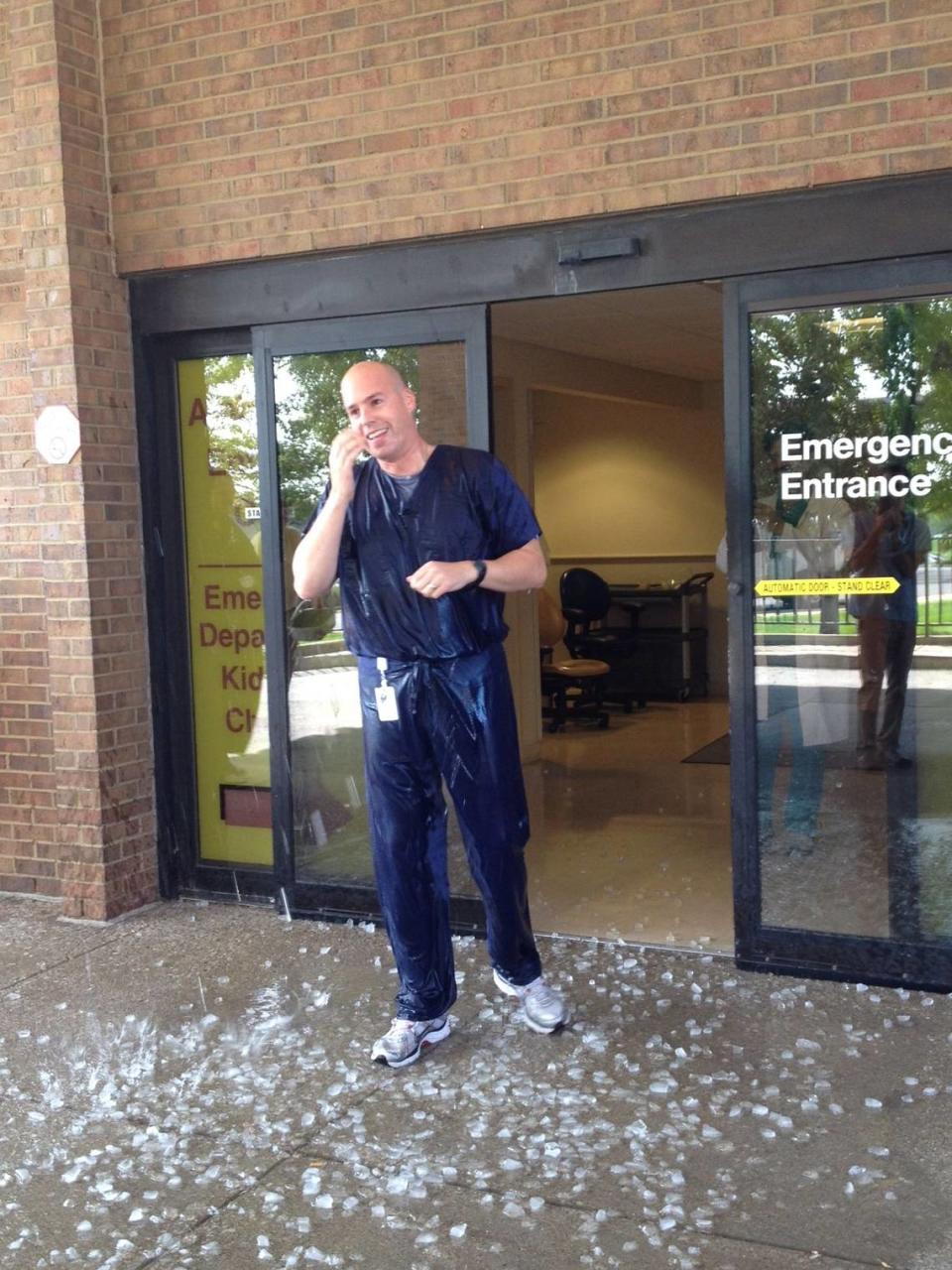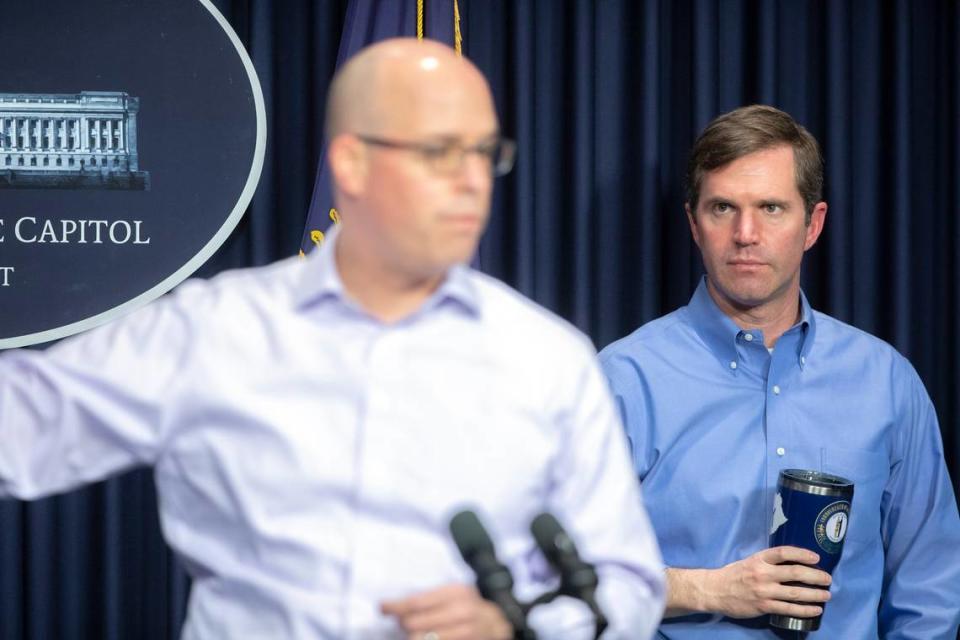The Kentucky doctor who advises Gov. Beshear recounts ‘emotional toll’ of fighting COVID-19
- Oops!Something went wrong.Please try again later.
About 75,000 to 90,000 people in Kentucky were expected to die. University of Kentucky’s Kroger Field only seats 61,000.
Dr. Steven Stack studied the horrific projections for the cornavirus pandemic. He had been Kentucky’s public health commissioner for about a month in March 2020, and he knew “the sheer enormity” of the task at hand.
Kentucky had no tests for the virus, not enough personal protective equipment for front-line health workers and a small supply of masks, said Stack. More and more deaths were being reported.
Stack, who advises Gov. Andy Beshear on health issues, was to become the state’s point person on COVID-19.
Kentuckians regularly would see the bespectacled, bald Stack, who has a penchant for bow ties, by Beshear’s side at news conferences to provide updates on the deadly virus. They would see an articulate doctor who did not shy away from showing his emotions at the sorrow that unfolded.
“We were fortunate to have him in that role. History will be kind to him,” said Crystal Miller, public health director for the WEDCO District Health Department which serves citizens in Scott, Bourbon, Nicholas and Harrison counties. Harrison County was the first in the state to report a COVID-19 patient.
“From the start of this ordeal, Dr. Stack’s compassion, care and knowledge always were present,” said Miller.
“I’ve been in this role for 14 years and have never seen this kind of attention from the state health commissioner. He always made time for you and he knew how to lead.”
Early years and education
Steven Stack was born Feb. 15, 1972, in Cleveland to Ray and Kathe Stack. They had a daughter about three years later named Tina, who is now a pharmacist.
Steven was raised in the Catholic church and attended Catholic schools in Cleveland — St. Mark’s through the eighth grade and St. Ignatius High School.
“I was a pretty good student. I was a chubby, dorky kid with a complete absence of athletic ability,” he said.
Stack received a full scholarship to study classical Greek and Latin from College of the Holy Cross in Worcester, Mass. He also took pre-medical classes in college.
After graduating magna cum laude from college, he returned to Ohio to complete four years of medical school and three years of emergency medicine residency at The Ohio State University before moving to Memphis to begin his clinical practice.
Stack worked as an emergency room physician and director at Baptist Memorial Hospital in Memphis for five years and got married in 2001. In 2006, Stack and his wife, Tracie, moved to Lexington. She is board certified in pediatrics and allergy/immunology and also holds a PhD. They have a 16-year-old daughter, Audrey.
Stack served as medical director of multiple emergency departments including St. Joseph East in Lexington and helped staffing at St. Joseph Mt. Sterling and Bourbon Community Hospital.

In 2006, Stack was the first emergency physician ever elected to the American Medical Association board of trustees. He subsequently served as board chair and in 2015-2016 became the AMA’s youngest president since 1854.
In 2018, Stack joined the University of Tennessee Haslam College of Business as an adjunct professor. He had received a Master’s degree in business from the school.
Stack also served on several national boards dealing with health care policy and health information technology before joining Kentucky’s government.
‘Many hands work for light lifting’
Stack had met briefly Andy Beshear at a few events before Beshear became governor in December 2019.
Beshear’s transition team took applications for various jobs in the new administration and Stack applied for state public health commissioner.
“I enjoy engaging with other people and hopefully having the opportunity to influence them,” he said. “That involves some component of leadership. I thought I would enjoy the opportunity to know what it was like to serve in a government-appointed job.”
In his job interview with Beshear, said Stack, “The only thing he ever asked of me to do was to do my job the best I could.”
As the state public health chief, Stack heads a department with about 450 employees and an operating budget of about $380 million. Its mission is to improve the health and safety of people in Kentucky.
Stack said his leadership style is not one of telling people what to do but “to work with people to help them maximize their full potential. Many hands work for light lifting.”
The salary for the job is among the highest in state government at $212,738 a year.
Within a month on the job, Stack would throw 40-hour work weeks out the window and be tested like no other Kentucky public health commissioner.

Science over politics
On March 6, 2020, Beshear announced the first case of COVID-19 in Kentucky. He also declared a state of emergency.
“The death of more than 7,000 people here for a condition that didn’t exist until 2020 is a tragedy,” said Stack. “The silver lining, if there is one, is that the projections were too dire.”
Throughout the pandemic, various businesses and political opponents criticized the Beshear administration’s handling of the virus, especially calling for early reopening. Stack’s home mail box was vandalized with messages that COVID-19 was a hoax.
Stack said it’s understandable that when people are fearful and angry, they might disagree with people “driving the bus.”
“When that happens, there is a whole lot of times when you agree with the frustrations, you share the difficulties and uncertainties but you still have to make decisions with the best information available and the best good-faith manner you can. That is difficult.”
Stack said he learned from his classical studies that there always has been public criticism of government but he acknowledged that the cries of dissent from sound medical advice took “an emotional toll.” The job with all the deaths and public scrutiny was always with him.
“What kept me going?” Stack asked. “A lot of people out there who I think and hope saw someone who cared,” he said answering his question.
Especially pleasing to him, said Stack, was that Beshear always sided with science over politics. “He made his decisions on the best of his ability and the science we gave him and the best information we had.”
At some of the news conferences, Stack’s voice choked and eyes moistened. He had an uncle in Ohio die from COVID-19.
“I think one of the things we need our leaders to do more is to be willing to show their own vulnerability,” said Stack. “When we put up these veneers and this facade that somehow we are impervious to the pressures and stresses, that plays into this false appearance for others that it’s not OK to say I don’t know, that it’s not OK to be scared, that it’s not OK to be fearful or uncertain.
“It is OK to for all those things. It would be a lot better if we acknowledge those things.”
Sheila Schuster, a veteran health care advocate in Louisville, said Stack’s “compassion was reassuring. He always was open, transparent. You can tell he is smart but he never talked down to people.”
Ben Chandler, president and chief executive officer of Foundation for a Healthy Kentucky, said Stack did “a remarkable job. In addition to his knowledge, he is a gifted communicator.”
State Republican Sen. Ralph Alvarado, a Winchester physician, who chairs the Senate Health and Welfare Committee, “politely declined” to comment on Stack’s performance during the pandemic. House Health and Welfare Chair Kimberly Poore Moser, a Republican retired nurse from Independence, did not respond when asked for comment.
‘How to nearly neutralize this threat’
Stack said his agency will keep on monitoring the virus. COVID-19 is vaccine manageable, he said. “We have learned effectively how to nearly neutralize this threat.”
Asked if he has pledged to Beshear to stay on as the state’s doctor for the rest of Beshear’s term, Stack said he serves at the pleasure of the governor. “I enjoy my collaboration with the governor. It’s a privilege to serve with and for him.”
Does he have any political aspirations? “I would be happy never to have my name on a ballot,” he said.
At the June 11 news conference in which Beshear signed documents in the Capitol Rotunda to lift most of the COVID-19 restrictions to try to return the state to some normalcy, the governor gave the first signing pen to Stack, who was wearing a bow tie, his clothing trademark.
Beshear thanked Stack for “his incredible work, for his resolve, for his willingness to take just as many slings and arrows as I have and for always sticking with the right thing to do.”
That night, Stack “went to dinner at a restaurant with my wife. That is something we had not done for a long time.”

